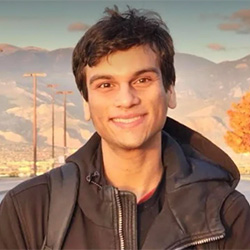CS Senior Spotlight: Amil Dravid
 Amil Dravid graduates this month with a bachelor’s degree in computer science from Northwestern Engineering. He plans to start a PhD program in artificial intelligence at the University of California, Berkeley, in the fall, advised by Alexei Efros in the Berkeley Artificial Intelligence Research Lab.
Amil Dravid graduates this month with a bachelor’s degree in computer science from Northwestern Engineering. He plans to start a PhD program in artificial intelligence at the University of California, Berkeley, in the fall, advised by Alexei Efros in the Berkeley Artificial Intelligence Research Lab.
Winner of a Northwestern CS Outstanding Senior award “for contributions to research in computer vision and machine learning,” Dravid was named a finalist in the Computer Research Association (CRA) 2023 Outstanding Undergraduate Researcher Awards. The nationwide award program recognizes undergraduate students who demonstrate exemplary potential in computing research. He is also a recipient of the Barry M. Goldwater Scholarship, which recognizes undergraduate excellence in research across scientific disciplines.
Dravid’s research interests broadly center on generative models, explainability, and reliability in computer vision, a subfield of artificial intelligence (AI) that trains models to process, interpret, and analyze inputs like images and videos. By leveraging an approach that disentangles, or separates, computer vision concepts and high-level abstractions, he develops tools to explain the internal mechanisms of machine learning algorithms as well as generate new photos and videos.
Dravid is advised by Aggelos Katsaggelos, Joseph Cummings Professor of Electrical and Computer Engineering and (by courtesy) of computer science and director of the Image and Video Processing Laboratory.
We asked Dravid about his experiences at Northwestern Engineering, impactful collaborative experiences, and his advice for current students.
Why did you decide to pursue the CS major at McCormick?
I knew I wanted to pursue computer science because of my interest in AI. CS in McCormick was the natural choice because I wanted to get a broad engineering background which would equip me with strong problem-solving skills.
How did the McCormick curriculum help build a balanced, whole-brain ecosystem around your studies in CS?
As a Taekwondo athlete and jazz musician, I value an all-around approach. McCormick's Whole-Brain Engineering philosophy helped me develop as an all-around thinker. Developing communication proficiency through the Design Thinking and Communication (DTC) course helped me build collaboration and writing skills necessary for teamwork in research. Additionally, the mathematical problem-solving and coding skills I developed through Engineering Analysis were a cornerstone for tackling research problems.
What are some examples of collaborative or interdisciplinary experiences at Northwestern that were impactful to your education and research?
One of my most memorable collaborative experiences was working on a research project in which our team developed an AI algorithm for detecting COVID-19 with chest X-rays. This involved interacting with an interdisciplinary team spanning electrical engineering, computer science, and medicine. Because of the interdisciplinary nature of this project, I took an interest in the impact of AI in fields outside of computer science, especially medicine, where the reliability of AI is key.
What skills or knowledge did you learn in the undergraduate program that you think will stay with you for a lifetime?
Since the undergraduate program exposes you to a wide variety of subjects within and outside computer science, I had the great fortune of interacting with a diverse group of students and faculty with different interests. I think this experience of interacting with people not in your niche is valuable and perhaps unique to the undergraduate experience. As I begin my graduate studies, I will take this lesson with me and try to connect with more people outside of my particular field of study.
What's next? What are your short- and long-term plans/goals in terms of graduate studies and/or your career path?
I will begin my PhD in artificial intelligence at the University of California, Berkeley, starting this fall. I aspire to continue this research path afterward as well.
What advice do you have for current Northwestern CS students?
Try to expose yourself to different experiences, such as internships and research, in order to find what you are passionate about! Supplement classes with your own exploration, and don't just rely only on what other people are doing to pave your own path.
